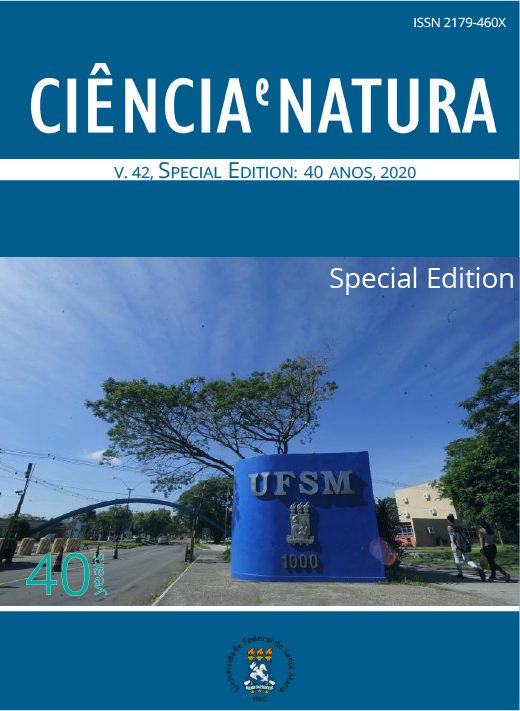A viabilidade do uso do pêndulo simples como ferramenta no ensino de física do ensino médio para o cálculo da aceleração da gravidade local
DOI:
https://doi.org/10.5902/2179460X40673Palavras-chave:
Pêndulo simples, Aceleração da gravidade, EnsinoResumo
Conhecer o valor g da aceleração da gravidade é de suma importância em diversas análises, e há várias maneiras de obtê-lo experimentalmente. Aqui, buscando recursos de fácil aplicação em salas de aula do ensino médio, os autores optaram pela observação de um pêndulo simples, realizando uma série de medições do período do pêndulo e aplicando-as às equações (adequadamente manipuladas para este experimento) deste movimento oscilatório. O experimento foi realizado em quatro etapas: uma com uma massa de 10 gramas e três com uma massa de 20 gramas; duas com dez oscilações, uma com quinze e uma com vinte. Como resultado, foram estimados quatro valores da aceleração local, os quais foram validados, utilizando-se a teoria dos erros, com o valor disponibilizado na literatura. Com esses dados, verificou-se a viabilidade do uso deste dispositivo no processo de ensino-aprendizagem, dados a sua facilidade em manuseio e montagem, o seu baixo custo e o seu irrisório erro com o valor da literatura.
Downloads
Referências
Doca, R. H., Biscuola, G. J., Villas, N., Bôas (2013). Física I, vol 1, 2º edn. Saraiva, São Paulo.
Fuke, L. F., Yamamoto, K. (2010). Física para o Ensino Médio, vol 1, 1º edn. Saraiva, São Paulo.
Halliday, D., Resnick, R., Walker, J. (2009). Fundamentos de Física, vol 2, 8º edn. LTC, Rio de Janeiro.
Halliday, D., Resnick, R., Krane, K. S. (2013). Física, vol 2, 5º edn. LTC, Rio de Janeiro.
Hewitt, P. G. (2011). Física Conceitual, 11º edn. Bookman, Porto Alegre.
Lopes, W. (2009). Variação da aceleração da gravidade com a latitude e altitude. Caderno Brasileiro de Ensino de
Física, 25 (3), 561–568, URL https://periodicos.ufsc.br/index.php/fisica/article/view/2175-7941.2008v25n3p561.
Werner da Rosa, C., Becker da Rosa, A. (2012). O ensino de ciências (física) no brasil: da história às novas orientações educacionais. Revista Ibero-americana de Educação, 58 (2), 1–24, URL https://rieoei.org/RIE/article/view/1446.
Torres, C. M. A., Ferraro, N. G., de Toledo Soares, P. A., Penteado, P. C. M. (2016). Física, vol 1, 4º edn. Moderna,
São Paulo.
Young, H. D., Freedman, R. A. (2008). Física II, 12º edn. Addison Wesley, São Paulo.
Publicado
Como Citar
Edição
Seção
Licença
Para acessar a DECLARAÇÃO DE ORIGINALIDADE E EXCLUSIVIDADE E CESSÃO DE DIREITOS AUTORAIS clique aqui.
Diretrizes Éticas para Publicação de Revistas
A revista Ciência e Natura está empenhada em garantir a ética na publicação e na qualidade dos artigos.
A conformidade com padrões de comportamento ético é, portanto, esperada de todas as partes envolvidas: Autores, Editores e Revisores.
Em particular,
Autores: Os Autores devem apresentar uma discussão objetiva sobre a importância do trabalho de pesquisa, bem como detalhes e referências suficientes para permitir que outros reproduzam as experiências. Declarações fraudulentas ou intencionalmente incorretas constituem comportamento antiético e são inaceitáveis. Artigos de Revisão também devem ser objetivos, abrangentes e relatos precisos do estado da arte. Os Autores devem assegurar que seu trabalho é uma obra totalmente original, e se o trabalho e / ou palavras de outros têm sido utilizadas, isso tem sido devidamente reconhecido. O plágio em todas as suas formas constitui um comportamento publicitário não ético e é inaceitável. Submeter o mesmo manuscrito a mais de um jornal simultaneamente constitui um comportamento publicitário não ético e é inaceitável. Os Autores não devem submeter artigos que descrevam essencialmente a mesma pesquisa a mais de uma revista. O Autor correspondente deve garantir que haja um consenso total de todos os Co-autores na aprovação da versão final do artigo e sua submissão para publicação.
Editores: Os Editores devem avaliar manuscritos exclusivamente com base no seu mérito acadêmico. Um Editor não deve usar informações não publicadas na própria pesquisa do Editor sem o consentimento expresso por escrito do Autor. Os Editores devem tomar medidas de resposta razoável quando tiverem sido apresentadas queixas éticas relativas a um manuscrito submetido ou publicado.
Revisores: Todos os manuscritos recebidos para revisão devem ser tratados como documentos confidenciais. As informações ou ideias privilegiadas obtidas através da análise por pares devem ser mantidas confidenciais e não utilizadas para vantagens pessoais. As revisões devem ser conduzidas objetivamente e as observações devem ser formuladas claramente com argumentos de apoio, de modo que os Autores possam usá-los para melhorar o artigo. Qualquer Revisor selecionado que se sinta desqualificado para rever a pesquisa relatada em um manuscrito ou sabe que sua rápida revisão será impossível deve notificar o Editor e desculpar-se do processo de revisão. Os Revisores não devem considerar manuscritos nos quais tenham conflitos de interesse resultantes de relacionamentos ou conexões competitivas, colaborativas ou outras conexões com qualquer dos autores, empresas ou instituições conectadas aos documentos.






